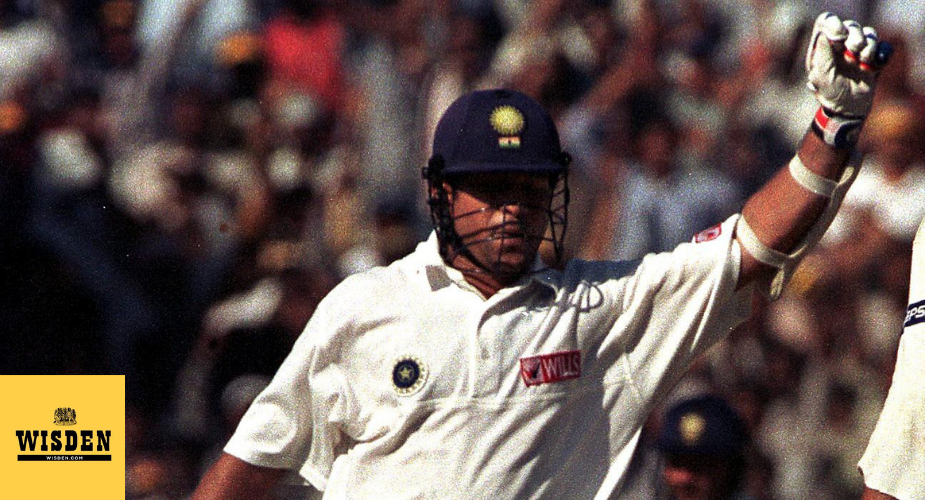Wisden’s Test innings of the 1990s, No.5: Sachin Tendulkar’s 136

Voted No.5 in Wisden’s Test innings of the decade in our 1990s in Review series, Manoj Narayan looks back at the epic 136 Sachin Tendulkar scored against Pakistan in Chennai, a knock which symbolised India’s story that decade.
No.5: Sachin Tendulkar 136 (273 balls)
India v Pakistan, 1st Test
MA Chidambaram Stadium, Chennai
January 28-31, 1999
Sachin goes, India gone. It was a truism in the Nineties, a decade in which a teenage Tendulkar quickly rose in stature, and was, by the end of it, the one player on whom all of India’s hopes rested on. That fact was never more evident than in the Chennai Test against Pakistan in 1999. India were 17 runs from victory by the end of a remarkable four days. Then Sachin went, and India were gone.
The pure figures don’t convey the full magnitude of the knock, even if they are impressive. Tendulkar scored 136 runs off 273 balls in the second innings of that match. The knock comprised 18 fours. He was in the middle for an incredible 405 minutes. Against an attack comprising Wasim Akram, Waqar Younis, Saqlain Mushtaq and a young Shahid Afridi. But, again, none of these convey the full majesty of the innings.
As with all India-Pakistan matches, there was an added edge to proceedings during the course of that match. This was Pakistan’s first tour to India in 12 years, and, according to a report in ESPNcricinfo, fundamentalists in India had threatened to disrupt the visit. There was an air of uncertainty around the series, security was tight and the pressure metre was generally on the higher side.
Tendulkar was dismissed for a duck in the first innings, as India responded to Pakistan’s 238. Half-centuries from Rahul Dravid and Sourav Ganguly helped them to a 16-run lead, but that vanished in the face of a second-innings assault from Afridi, who hammered a 191-ball 141 which formed a majority of Pakistan’s total of 286. It left India needing 271 to win.
Things didn’t begin well for the home side. Tendulkar was in the middle within six overs, after India were reduced to 6-2, and despite a brief partnership with Dravid, India were soon struggling at 82-5, with only Nayan Mongia and a long tail giving Tendulkar company. Akram, Younis and Mushtaq were all amongst the wickets and India were back to their default setting: pin all hope on Tendulkar, who was assiduous as wickets fell all around him.
Keeping out of his mind a chirpy Pakistan close-in field, Tendulkar reached his half-century in 136 deliveries – that is around three-and-a-half hours. With Mongia offering reasonable support, Tendulkar led the fight back back.
It was a nervous time. Time and again Mushtaq would seemingly get the better of him with one that would suddenly and sharply turn in. Every appeal was turned down, though, and each time, the Chennai crowd would roar its approval.
Having got to his fifty, Tendulkar increased the tempo. His next 50 runs came at a relatively quicker clip, in 99 balls, and he repeatedly made use of lap shots that had the crowd oohing. Slowly, the Pakistan bowlers’ frustrations came to the fore, especially when Tendulkar brought out that trademark punch off the back foot through covers.
Moin Khan, the wicketkeeper, didn’t know where to look after missing a rare chance, when Mushtaq tempted Tendulkar, who had passed 90 by this point, out of his crease and deceived him with turn. Moin couldn’t gather the ball with Tendulkar miles out of his crease as Mushtaq nearly popped a vein in frustration.
The over yielded 16 runs, as Mongia put away a couple too and India seemed on course for the target.
"It’s a knock that seems to increase in awe-factor the more you watch it, even all these years later."https://t.co/jvX9HktfVW
— Wisden (@WisdenCricket) November 18, 2020
The hundred came – after 340 minutes in the middle – and while Tendulkar was momentarily delighted, the helmet didn’t come off as it usually does. Instead, after quickly acknowledging the loud cheers, he was in the middle of an animated conversation with Mongia. The job was far from complete. Something about reaching the ton sparked Tendulkar. He wanted to finish it off soon.
And out came the classic strokes: the immaculately balanced push through covers, the defensive straight prod that somehow beats everyone to the fence, the authoritative dance down the track and a pummel through long-on. India seemed convinced they had this in the bag.
Perhaps India would have fared better had Tendulkar not accelerated. They were just 17 runs away when he played one shot too many, Mushtaq getting his man as Tendulkar’s leading edge fell to Akram at mid-off.
Pakistan were beyond excited, as a dejected Tendulkar walked back, his hunched shoulders betraying his disappointment in himself. His 136 was by far the highest score in the innings, and only two other batsmen made it to double digits. It was a knock for the ages.
But in keeping with the theme of the decade, Tendulkar’s wicket signalled India’s loss. Four wickets were claimed for four runs thereafter, as Pakistan won by 12 runs.
Sachin goes, India gone.

